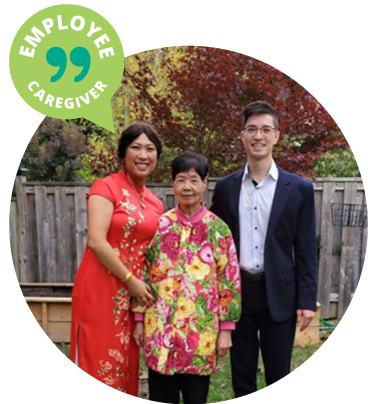Connie Tang and Tim Ahong,
caring for her grandmother
Connie: I’ve always had a close relationship with my grandmother. She raised me during my childhood. Tim has embraced this relationship and I’m lucky to have a partner who’s willing to move in with her, especially since she has advanced dementia. It isn’t always easy for us, as it has added an additional layer of stress, but I wouldn’t have it any other way.
Tim: My wife Connie has taken on a significant amount of responsibility in caring for her grandmother. I’m glad I can help and support her, but the move into her grandmother’s apartment hasn’t affected me the way it has affected her. I work in senior care, so everyone at my work understands if I need to speak to a PSW while I’m in a meeting. I’d say the only impact is on our family planning. I find it hard to get excited about having kids while we’re caring for Connie’s grandmother, but I know that kids will happen down the line.
We’re fortunate to have a support system in all areas of our lives. My grandmother has lived in the building we moved into for over 20 years, and throughout that time she has made close friends—now our extended family. They help us by making her breakfast at 4 a.m. and taking her for walks throughout the day. We see them multiple times a day. My [Connie’s] dad has temporarily moved in as well. And we have PSWs that come in daily. This is a team effort, and we couldn’t care for her without all this support. For us, overall, we feel fortunate to be able to be caregivers for my grandmother.
Our employers have been extremely supportive, understanding, and flexible. Without their support or the flexibility they’ve had in terms of going into the office, the opportunity to spend this time with my grandmother would not be possible. We feel very privileged. While our employers are excellent in supporting us, we know not every employer is this understanding. We hope that more employers value inclusive hiring and promotion cultures to welcome, support, (and encourage) staff who may have caregiving responsibilities.

“We understand that caregiving adds to you as a person, and we hope that people aren’t penalized for it at work.”

“We understand that caregiving adds to you as a person, and we hope that people aren’t penalized for it at work.”
Connie Tang and Tim Ahong,
caring for her grandmother
Connie: I’ve always had a close relationship with my grandmother. She raised me during my childhood. Tim has embraced this relationship and I’m lucky to have a partner who’s willing to move in with her, especially since she has advanced dementia. It isn’t always easy for us, as it has added an additional layer of stress, but I wouldn’t have it any other way.
Tim: My wife Connie has taken on a significant amount of responsibility in caring for her grandmother. I’m glad I can help and support her, but the move into her grandmother’s apartment hasn’t affected me the way it has affected her. I work in senior care, so everyone at my work understands if I need to speak to a PSW while I’m in a meeting. I’d say the only impact is on our family planning. I find it hard to get excited about having kids while we’re caring for Connie’s grandmother, but I know that kids will happen down the line.
We’re fortunate to have a support system in all areas of our lives. My grandmother has lived in the building we moved into for over 20 years, and throughout that time she has made close friends—now our extended family. They help us by making her breakfast at 4 a.m. and taking her for walks throughout the day. We see them multiple times a day. My [Connie’s] dad has temporarily moved in as well. And we have PSWs that come in daily. This is a team effort, and we couldn’t care for her without all this support. For us, overall, we feel fortunate to be able to be caregivers for my grandmother.
Our employers have been extremely supportive, understanding, and flexible. Without their support or the flexibility they’ve had in terms of going into the office, the opportunity to spend this time with my grandmother would not be possible. We feel very privileged. While our employers are excellent in supporting us, we know not every employer is this understanding. We hope that more employers value inclusive hiring and promotion cultures to welcome, support, (and encourage) staff who may have caregiving responsibilities.

